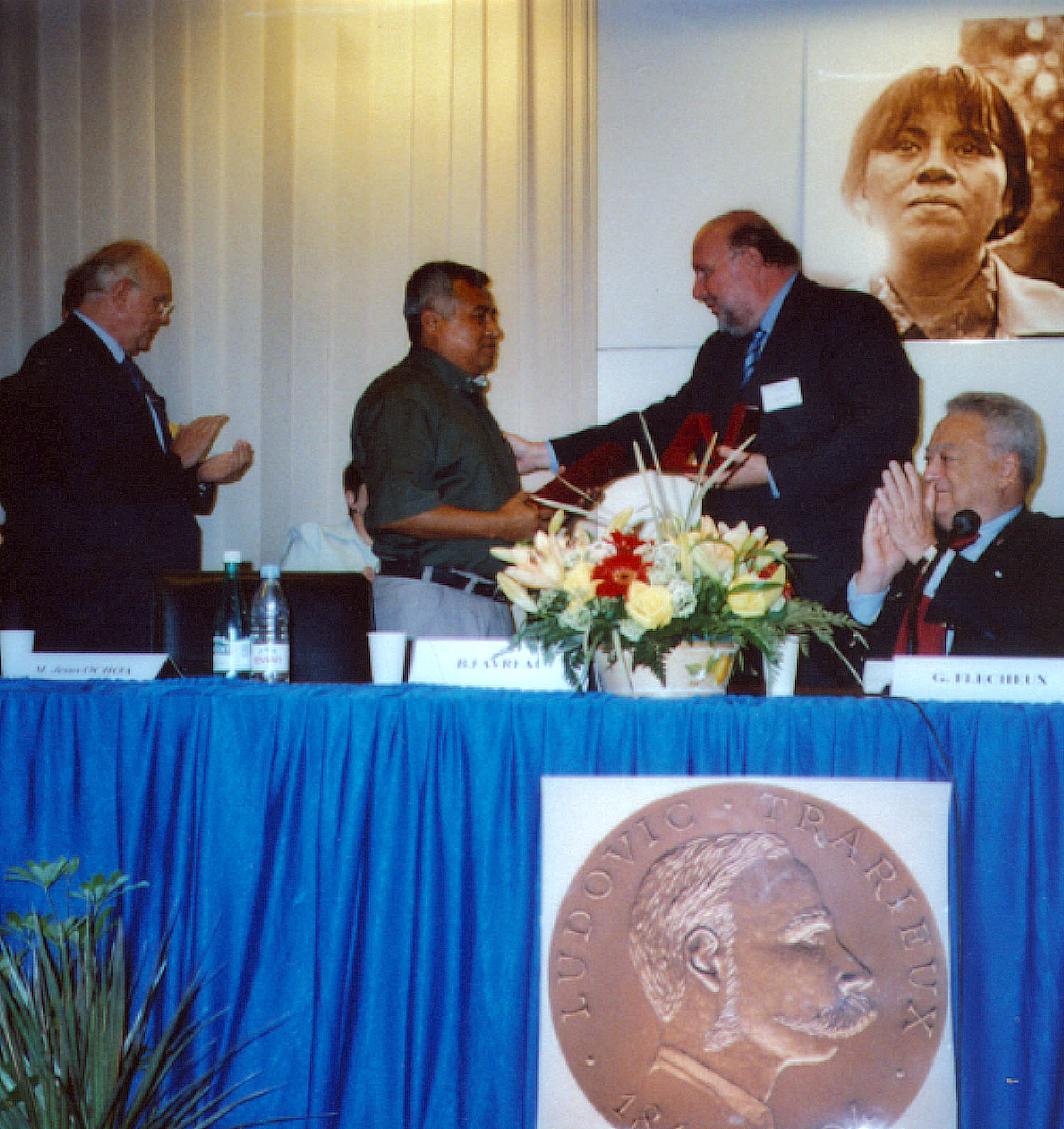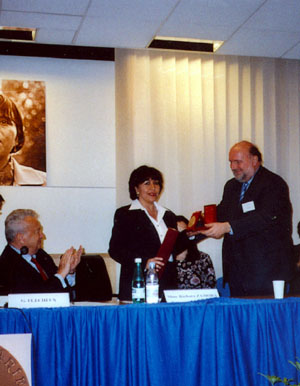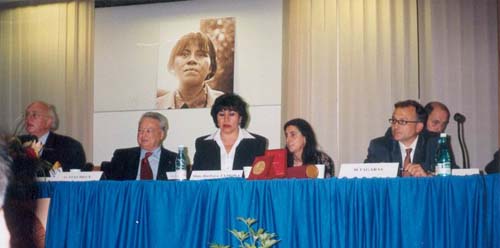


Ludovic Trarieux Historical account The Prize 2000 The Prize 2002 The Prize 2003 The Prize 2004 The Prize 2005 Le Livre d'Or

|

|
|

|
Premio Internacional de
Derechos Humanos Ludovic Trarieux 2003
Internationalen
Ludovic-Trarieux-Menschenrechtspreis 2003
Prêmio Internacional de
Direitos Humanos Ludovic Trarieux 2003
Premio Internazionale per i
Diritti Umani Ludovic Trarieux 2003
Ludovic Trarieux Internationale Mensenrechtenprijs 2003
The 8th International Human Rights Prize “Ludovic Trarieux” 2003 (post mortem) and by the Chairman of the Brussels Bar Association , Bâtonnier Jean CRUYPLANTS From l. to r. : Dr Alfred KRIEGLER, Président Union des Avocsts Européens, le bâtonnier Yves DELAVALLADE, M. Jesus OCHOA y PLÁCIDO, le bâtonnier FAVREAU, président de l'IDHAE, le bâtonnier FLECHEUX, président de l'Institut des Droits de l'Homme du Barreau de Paris,, Mme Bárbara ZAMORA, M. Haris TAGARAS, du barreau d'Athènes,le bâtonnier Jean CRUYPLANTS bâtonnier de l'Ordre français des Avocats au barreau de Bruxelles. Digna
Ochoa y Plácido Barbara
Zamora Lopez The Jury called the Mexican authorities
to ensure an effective, independent and
thorough investigation into the killing
of Digna Ochoa and expressing deep concern for the safety of Bárbara
Zamora and urged to give her
immediately an appropriate protection. The 21 European lawyers members* (see list in footnote) of the
Jury of the "LUDOVIC-TRARIEUX INTERNATIONAL HUMAN RIGHTS PRIZE »
meeting in Brussels Court’s House, on Friday 13 June 2003 awarded the eighth « Ludovic-Trarieux » Prize,
created in 1984 (first prize winner Nelson Mandela then in jail) and awarded
every year to a lawyer, regardless of
nationality or Bar, who, by his work, will have illustrated his activity or his
suffering, the defence of human rights, of defence rights, the supremacy of
law, the struggle against racism and intolerance in any form and given jointly by the HUMAN RIGHTS INSTITUTES OF THE BAR Of BORDEAUX, the HUMAN RIGHTS INSTITUTE OF THE BAR OF PARIS
and the EUROPEAN BAR HUMAN RIGHTS INSTITUTE ( IDHAE), jointly to (post mortem) and Digna Ochoa y Plácido, was shot dead in her
office in the center of Mexico City on October 19, 2001. A former Roman Catholic nun, Digna Ochoa was
working as the head of the legal division of the Miguel Agustín Pro Juárez
Center for Human Rights (PRODH) for many years on cases in which public
officials, including members of the Offices of the Attorney General and the
armed forces, had been implicated in serious human rights violations. Digna Ochoa was one of the
most prominent Mexican human rights defenders; her clients included
environmental activists Rodolfo Montiel Flores and Teodoro Cabrera García -arrested
on gun and drug charges-and accused terrorists Alejandro, Héctor and Antonio
Cerezo Contreras. By the mid 1990s, Digna and her colleagues at the PRODH, had one a
reputation as a centre of principled opposition to institutionalized abuse,
particularly in the emerging hot zones of Mexico’s indigenous south. As a
result, beginning in 1995 they were targeted for an escalating campaign of harassment,
intimidation and violence. In 1999, Digna was abducted twice and once held
hostage in her home for nine hours of interrogation before being left to die,
bound hand and foot in front of an opened gas valve. On this occasion, she
managed to free herself and escape. Digna Ochoa was repeatedly threatened,
twice kidnapped, tortured but the Mexican government never adequately dealt
with repeated threats leveled against her, and the investigation undertaken by
the Office of the Attorney General was unduly slow and cumbersome. Human rights groups
were furious last year when a previous special prosecutor, Renato Sales
Heredia, first advanced the suicide hypothesis. Sales ended up resigning. In a report presented officially on July
19, 2003, Mexican special prosecutor Margarita Guerra y Tejada concluded that
the shooting death of human rights attorney Digna Ochoa y Plácido on October
19, 2001, was a suicide. Guerra and a team of experts said ballistics studies
showed that given the location of the body in her Mexico City office, only
Ochoa could have fired the shot to the head that killed her. Guerra also
claimed that Ochoa suffered from chronic depression and other psychological
problems and had faked a kidnapping in 1988. The long-awaited ruling immediately drew
criticism from the many international human rights officials who knew Ochoa. Ochoa’s
family announced on July 19 that they would seek a federal injunction to keep
the local Federal District (DF, Mexico City) prosecutors from closing off the
investigation of other hypotheses. UPDATE JULY 22, 2003:
Continuing Weaknesses in Mexican Justice System Bárbara Zamora Lopez, also a leading human rights
lawyer in Mexico city, is a former colleague of Digna Ochoa in the law firm Tierra y Libertad
(Land and Freedom) which they set up together.
On
Monday, March 18th, 2002, Bárbara Zamora received emailed death threats that,
though elliptical in their content, were clear in their meaning, and that in their
wording closely resembled death threats received by the late Digna Ochoa and human rights
lawyer Pilar Noriega in 1996 when they were both members of the legal team of the Miguel
Agustín Pro Human Rights Centre. Although she received a number of death threats during 2001, this is the
first death threat that Bárbara Zamora has received this year. It goes without
saying that, especially after the assassination of Digna Ochoa on October 19th
2001, threats of this kind must be treated with the utmost seriousness. De g. à d. :Le bâtonnier FLECHEUX, président de l'Institut des droits de l'Homme du barreau de Paris,Mme Bárbara ZAMORA, le bâtonnier Jean CRUYPLANTS bâtonnier de l'Ordre français des Avocats au barreau de Bruxelles. On October 30th 2001, in reaction to the assassination of Digna
Ochoa, the Inter-American
Court of Human Rights requested the Mexican government to take special
protective measures
for the security of Bárbara Zamora. The government has still not fully complied
with this request. An agreement regarding the form that the protective measures were to
take was to have been signed by the two parties, that is to say by Bárbara Zamora and the
government. However, although a verbal agreement was reached in November 2001, the government has
not yet produced the final written text for signature. On March 20th, Bárbara Zamora
submitted her written comments on this situation to the Ministry of the Interior. With
regard to the opening of an investigation into the source of the emailed
threats, Bárbara Zamora has deplored the slowness of the Office of the Attorney General of the
Federal District (Mexico City) in reacting to her official complaint, which was made on March
19th. It appears that the Attorney General did not initially accord the matter a great deal of
importance, reportedly saying that it did not seem to be a death threat. Bárbara Zamora also rejected Margarita Guerra 's appointment, arguing her past experience as a
city prosecutor will hinder her ability to handle the case impartially. She
said she would ask officials to name a prosecutor without ties to the capital's
law enforcement. . The Jury called the Mexican authorities
to ensure an effective, independent and
thorough investigation into the killing
of Digna Ochoa and expressing deep concern for the safety of Bárbara
Zamora and urged to give her
immediately an appropriate protection. Bárbara Zamora Former Prize
Winners Historical account of the
Prize 1985 Nelson MANDELA (South Africa) 1992 Augusto ZÚÑIGA PAZ (Peru) 1994 Jadranka CIGELJ
(Bosnia-Herzegovina) 1996 awarded
jointly to Nejib HOSNI (Tunisia) and to Dalila MEZIANE
(Algeria). 1998 ZHOU Guoqiang (China) 2000 Esber YAGMURDERELI (Turquie) 2002 Mehrangiz KAR (Iran) The following was the list of Jury Members : * Members of Jury Ludovic
TRARIEUX Prize 2003 M. le bâtonnier Bertrand FAVREAU, Président de IDHAE, (Bordeaux) M. le bâtonnier Jean CRUYPLANTS, Bâtonnier de l’Ordre français des
Avocats du Barreau de Bruxelles (Bruxelles) M. le bâtonnier
Henri ADER, Ancien bâtonnier du barreau
de Paris (Paris) M. le bâtonnier
Georges FLECHEUX, Président de l’IDHBP (Paris) Me Gérard ABITBOL, Président de l’Union des Avocats Européens, membre de l’ IDHAE
(Marseille) Me Wojciech HERMELINSKI, President of Polish Bar Human Rights Institute
(Varsovie) Me Alfred KRIEGLER, Rechtsanwalt (Vienne) Me Christophe
PETTITI, Secrétaire général de l'Institut des Droits de l'Homme du Barreau
de Paris (Paris) Me Antoine
VALERY, Président de la Commission
française pour les droits de l’Homme de l’UNESCO (Paris) Monsieur le Bâtonnier Pierre KAPPELHOFF-LANCON, (Bordeaux) Me Pierre LAMBERT,
Président de l'Institut des Droits de l'Homme du Barreau de Bruxelles
(Bruxelles) Me Thierry BONTINCK, Trésorier de l’Union des
Avocats Européens (Bruxelles) Me Isabelle HUET, IDHBP (Paris) Me Nicole DEHRY,
IDHBP. (Paris) Me Michel
PUECHAVY, IDHBP.(Paris) Me Brigitte
AZEMA-PEYRET, IDHBB, (Bordeaux) Me Philippe FROIN,
Trésorier de l’IDHBB, (Bordeaux) Me Valérie
BRAILLON, secrétaire générale de l’IDHBB, (Bordeaux) Me Raymond BLET,
IDHBB, (Bordeaux) Me Hélène SZUBERLA, secrétaire générale de l’IDHAE (Bordeaux) Madame Marie France GUET, vice-présidente de l’IDHAE (Paris) More about Digna Ochoa :
including the French Judge in the ICC
presented on October 3, 2003
in the Great Amphitheâtre of the National School of the Judiciary of France in Bordeaux
to
Digna
Ochoa
Bárbara
Zamora
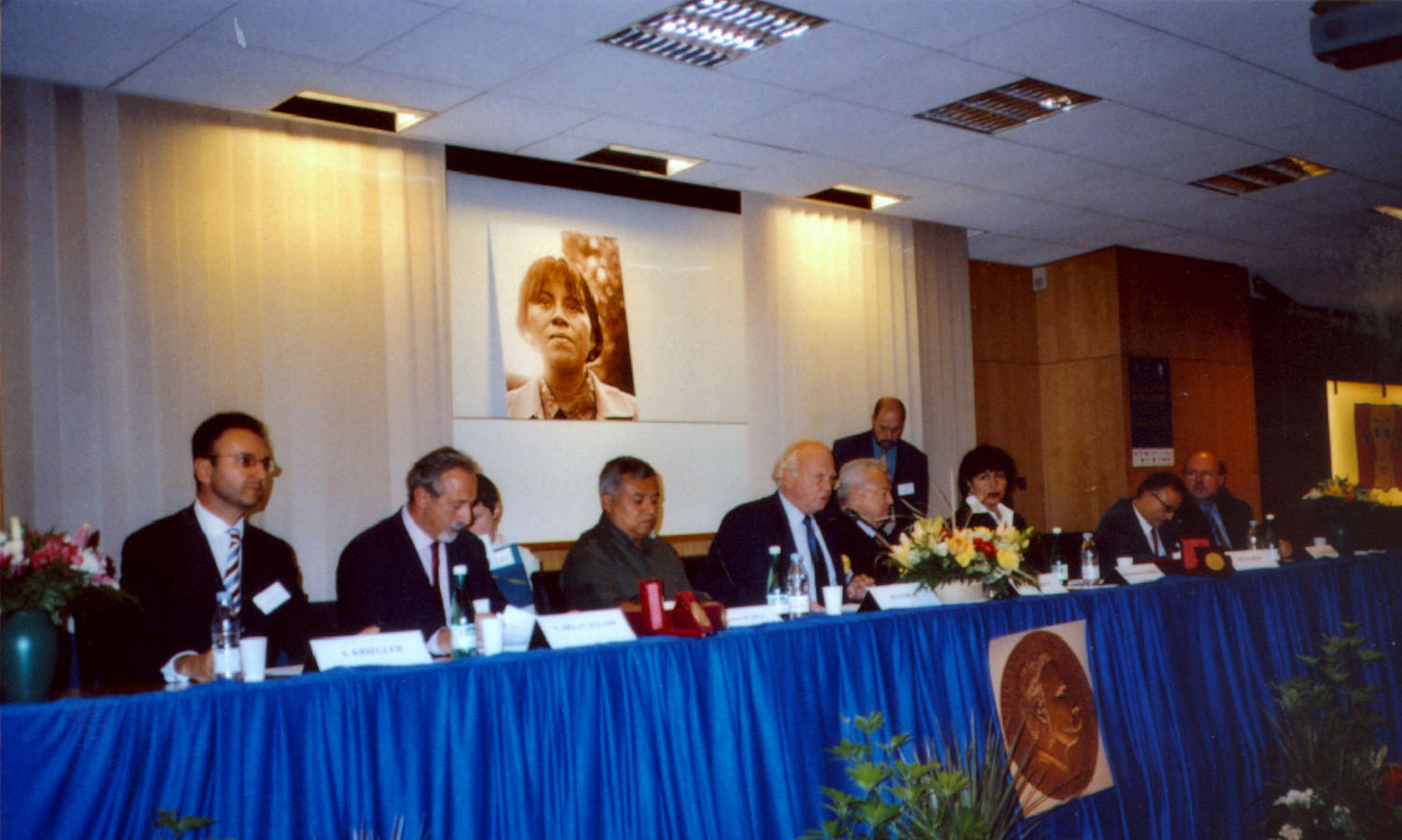
“The award given by lawyers to a
lawyer ”
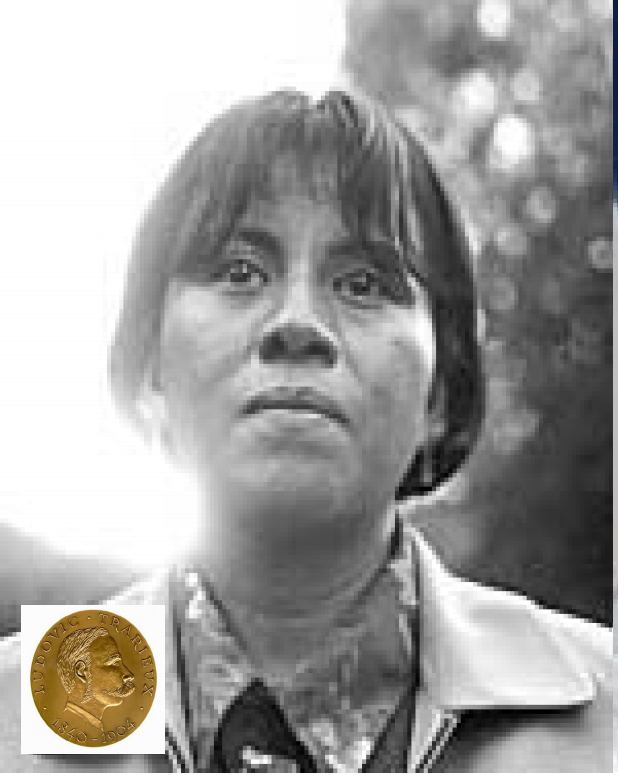
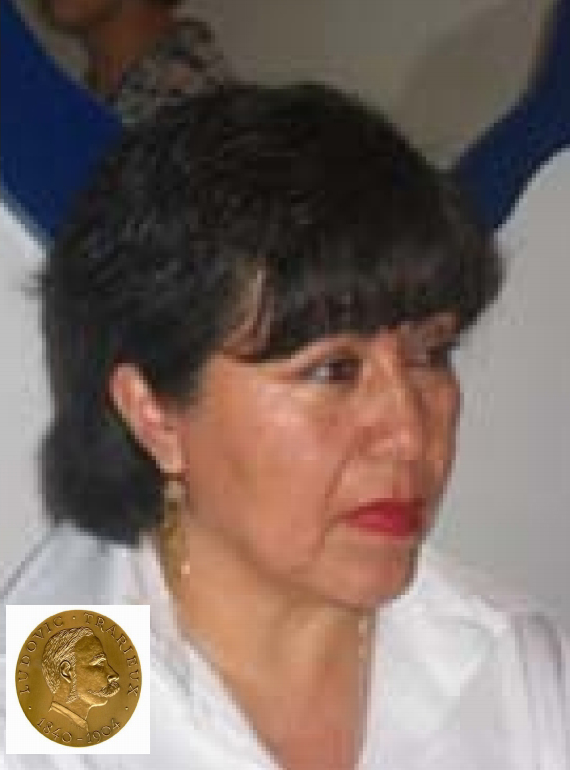
Digna Ochoa
y Plácido
Bárbara Zamora Lopez
It is the first time
since its creation that the Prize is awarded post mortem. According to
provision of Article 3 - 2°) of the Prize’s Regulations “In exceptional cases, the Prize can be
awarded post mortem to a lawyer who, in his dedication to the cause of human
rights, paid with his life in the two years preceding the date of the award.”
The Jury composed by
21 prestigious European lawyers* (see list in footnote) called the
Mexican authorities to ensure an
effective, independent and thorough investigation into the killing of Digna Ochoa and
expressing deep concern for the safety of Bárbara Zamora and urged to give her immediately an appropriate
protection.
